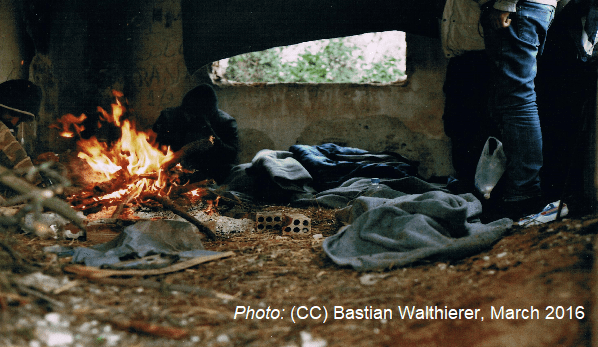Border Violence Monitoring Network (BVMN) recorded 30 pushbacks in August impacting more than 300 people on the move across migratory routes in the Balkans. More than 40 per cent of incidents recorded since 2017 have involved Afghan nationals. The situation for thousands of people on the move including many of Afghan origin along Bosnia and Herzegovina’s (BiH) north-western border with Croatia is dire, with systematic pushbacks by Croatian police and an increase in police raids and evictions in BiH where a “new Lipa” camp is under construction.
The BVMN report on illegal pushbacks and border violence August 2021 documents 30 violent pushback incidents involving 324 people. The recorded cases included men, women, children with guardians and unaccompanied children from Afghanistan, Morocco, Egypt, Iraq, Syria, Pakistan, Kashmir, Bangladesh, India, Algeria, Kurdistan, and Lebanon. The incidents were recorded across the region with seven pushbacks to Serbia (one chain pushback from Slovenia, one from Croatia, three from Hungary, two from Romania), 15 pushbacks to BiH (four chain-pushbacks from Slovenia, 11 from Croatia), one pushback from North Macedonia to Greece, and seven pushbacks to Turkey (one chain pushback from Bulgaria, five from Bulgaria, one from Greece). In the context of the current crisis in Afghanistan, a significant share of the recorded abuses have targeted Afghans en route. Since 2017 BVMN has recorded 481 violent pushback cases involving Afghans either as the subjects or witnesses across Balkan migratory routes. These pushbacks constitute 41% of the total of testimonies recorded by the network and involve some 11,300 people. Physical abuse, destruction or confiscation of belongings, and sexual humiliation are systematically used as deterrence measures by border guards and police in the Balkans. 77% of such incidents involved physical abuse of beatings and kicking, while 61% involved theft of belongings and 26% involved being forced to undress. A smaller but significant share involves the use of guns, dogs, electric shocks and water immersion. No Name Kitchen reports that a young Afghan man residing in a makeshift camp lost his life on the train tracks near the Serbian border with Croatia.
ECRE member the Danish Refugee Council (DRC) reports 60 pushbacks by Croatian police between 16 August and 29 August against Afghan families in BiH trying to reach Europe. “We were pushed back 12 times at the Croatian border. They stole our money and phones,” stated 25-year old Zihaul al-Haqq from Afghanistan. “We were pushed back the last time between 20 and 21 of August. Now Afghanistan is entirely under Taliban control, and we’ve been on the run for five and a half years. We’re very tired”. SOS Balkanroute reports of: “More and more people are currently coming back to Bosnia from Serbia and their first stop is mostly the east Bosnian city of Tuzla. According to information from our local helpers, there are currently an average of 30 to 40 new refugees arriving every day, who usually need everything after arrival: from food to clothes and shoes”.
Almost one year ago, the closure and destruction of the controversial Lipa camp on the north-western Bosnian border with Croatia left thousands sleeping rough: today, the situation remains dire for people on the move in the area. Thousands of people including many Afghans – one of the largest groups journeying via the Balkan route – remain stuck in the border region. They are forced to survive under harsh conditions in makeshift or formal camps such as Velika Kladusa where, according to local volunteers: “Several hundreds of people, by and large families from Afghanistan, have found a temporary shelter […most of whom] arrived in BiH over the last couple of months. Some were living for a long time in Greece: being unable to obtain a regular status or any chance to begin a normal life, they left and started their journey towards other parts of the EU. On the way, they got stuck in BiH. Their attempts to cross the borders with the EU are prevented by the violence of the border guards…”. Inside BiH people on the move are exposed to local hostility, police raids and evictions. According to a local volunteer: “They are trying to do everything without being too conspicuous, because they’re feeling the pressure of the authorities and the people against them”. In the recent month evictions of informal settlements in the woods and large squats in the city of Bihac have become more frequent and police raids have intensified. Evicted people report that such measures have become routine and are proudly featured on the social media pages of the local police force.
Media outlets have linked the evictions and raids by local authorities to the construction of a “new Lipa camp” that has been delayed but is reportedly soon to open. The new EU-funded camp will have a capacity of 1,500 people and the management will be passed from the International Organization for Migration (IOM) – who managed the former Lipa camp – to SFA, the Bosnian Foreign Affairs Service under the Ministry of Security. Despite the hardships of staying in makeshift camps or sleeping rough and facing police crackdowns, people on the move reportedly prefer even this modest and exposed reality to the isolation, undignified conditions and control measures of official camps. Italian outlet Il Manifesto summarizes the new Lipa camp as: “merely a band aid, and a poor one at that; but the intention of the Bosnian authorities is to turn it into the reception place for anyone arriving in BiH via the Balkan route, meeting the demands of the European Union and hiding the migrants away as much as possible from the eyes of their own citizens”.
For further information:
- ECRE, Balkan Route: Pushbacks, Violence, and Evictions Continue at High Pace as the Need for an Independent Border Mechanism Remains, June 2021
- ECRE, PRAB: New Report on Pushbacks Across Six European Countries, May 2021
Photo: (CC) Bastian Walthierer, March 2016
This article appeared in the ECRE Weekly Bulletin. You can subscribe to the Weekly Bulletin here.

